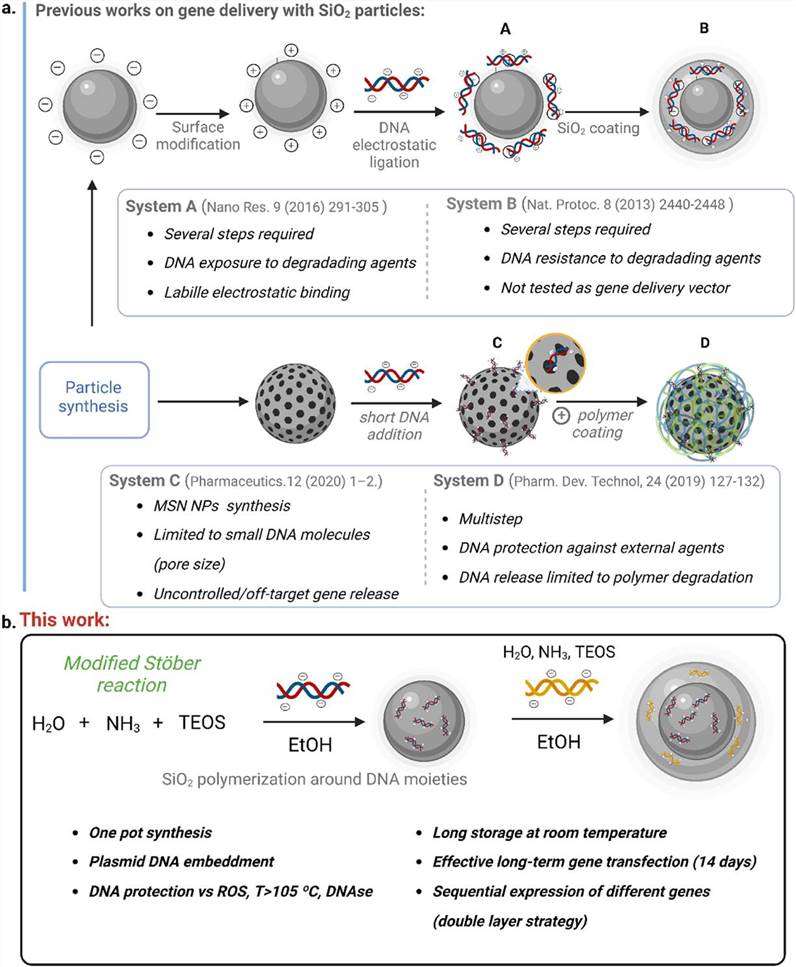SiNP Development for Nucleic Acid Delivery
InquiryNucleic acid therapies such as gene editing hold promise for treating cancer, but delivery into cells is challenging due to membrane impermeability and instability of nucleic acids. At CD Formulation, silica nanoparticles (SiNPs) have been developed to deliver nucleic acids like siRNA, miRNA, shRNA and CRISPR/Cas9 for cancer treatment.
Why Choose Silica Nanoparticles?
SiNPs offer several advantages for delivering nucleic acids. Their ease of synthesis, surface modification, and high loading capacity make them suitable for efficient encapsulation and protection of nucleic acids. The unique features of SiNPs, such as biocompatibility, stability, and controlled cargo release, enable targeted delivery to specific cells and tissues.
 Different ways for SiNPs to deliver nucleic acids (Ramos-Valle A.; et al., 2023)
Different ways for SiNPs to deliver nucleic acids (Ramos-Valle A.; et al., 2023)
What Can We Do for Nucleic Acid-Loaded SiNP Development?
- Nucleic Acid Synthesis and Purification
We use a variety of advanced synthetic technologies to prepare DNA, including:
- Phosphoramidite triester synthesis method
- Chip-based technologies: inkjet, photochemical and electrochemical methods.
- Ultra-high-throughput synthesis technology: semiconductor combined with electrochemical method.
- Enzymatic synthesis technology: microarray method, yeast in vivo DNA synthesis method, ligation-mediated DNA synthesis method.
Subsequent purification steps such as desalting, OPC, HPLC and PAGE are carefully executed to obtain high-purity nucleic acid drugs of excellent quality and efficacy.
- SiO2 Nanoparticle Synthesis
Through techniques like sol-gel synthesis and templating, we condense silica precursors like tetraethyl orthosilicate in the presence of structure-directing agents to form porous nanoparticles. Careful control of parameters (water content, catalyst concentration and temperature) allows the production of silica particles with tailored properties.
- Nucleic acids & SiNP Preparation and Characterization
| Electrostatic interaction |
Nucleic acids can be adsorbed onto the surface of silica nanoparticles through electrostatic interactions or hydrophobic interactions. |
| Incubation |
Simply incubating nucleic acids with pre-formed silica nanoparticles allows the acids to diffuse into and adsorb within the nanopores. |
| Co-condensation |
Nucleic acids are mixed with silica precursors during nanoparticle formation using the sol-gel process. As the particles polymerize around the nucleic acids, they become encapsulated within the silica matrix. |
| SiNP Characterization |
- Dynamic Light Scattering (DLS)
- Zeta Potential Analysis
- Fluorescence Spectroscopy
- UV-Vis Absorption
- Scanning/Transmission Electron Microscopy (SEM/TEM)
- Fourier Transform Infrared Spectroscopy (FTIR)
- Gel Electrophoresis
- Degradation Assays
|
- Accelerated Degradation Testing
Particles are subjected to high temperatures, extreme pH levels, and oxidative stressors like hydrogen peroxide for set time periods.
- Double/Triple Layer SiNPs Preparation
Our preparation of double/triple layer silica nanoparticles involves the sequential deposition of silica layers onto core particles, resulting in a multilayer structure. By controlling deposition conditions, we can achieve precise layer thickness and alignment. We can also coat the surface of SiNPs with specific polymers to achieve specific functions.
Applications of Our SiNP Development Services
|
Gene Expression |
- Messenger RNA
- Plasmid DNA
|
| Gene Silencing |
- Small Interfering RNA and microRNA
- Antisense Oligonucleotide
|
| Gene Editing |
|
Advantages of Our SiNP Development Services
- Silicon is the element closest to carbon, and colloidal silica is highly biocompatible and is currently used in a wide range of applications in the food production, cosmetics and pharmaceutical industries.
- We can encapsulate nucleic acids in single or multilayer silica nanoparticles without genetic/size limitations.
- The nucleic acid & silica nanoparticle delivery system we developed is highly stable and can protect the encapsulated nucleic acids from different biological and physicochemical stresses, including DNase, denaturation temperature or reactive oxygen species (ROS).
- We can surface functionalize silica particles with many different ligands, which can be used, for example, to target nanoparticles to specific cell types.
At CD Formulation, we provide fully customized silica nanoparticle development services to overcome challenges in nucleic acid delivery. If you seek a reliable partner for synthesizing, loading and characterizing silica nanoparticles, please contact us to design a tailored solution for your delivery needs.
References
- Zhang Y.; et al. Engineered silica nanoparticles for nucleic acid delivery. Small Methods. 2023, e2300812.
- Ramos-Valle A.; et al. One-pot synthesis of compact DNA silica particles for gene delivery and extraordinary DNA preservation. Mater Today Adv. 2023, 18: 100357.
Related Services



 Different ways for SiNPs to deliver nucleic acids (Ramos-Valle A.; et al., 2023)
Different ways for SiNPs to deliver nucleic acids (Ramos-Valle A.; et al., 2023)